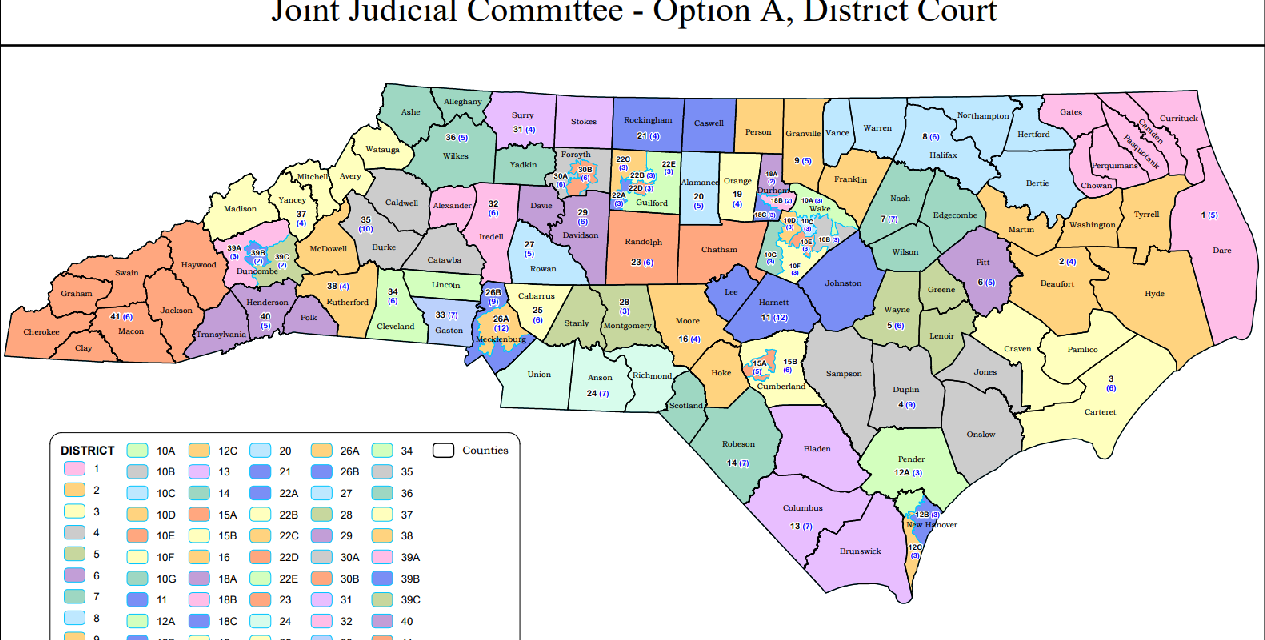Potential changes to North Carolina’s judicial election districts considered by House and Senate members are taking a backseat for now to pending litigation over the General Assembly’s own districts, legislative leaders said Monday.
Top Republican negotiators had said late last week they were hopeful an agreement could be reached sometime this week on new election boundaries for trial court judgeships and local prosecutors. But those comments came hours before a three-judge panel approved changes to two dozen legislative districts made by a court-appointed expert.
GOP lawmakers criticized the panel’s decision and said they want a court — possibly the U.S. Supreme Court — to block those changes, or at least allow them to make changes themselves instead of the special master. Their lawyers filed a delay request late Sunday with the three judges. Redrawing maps could require a quick turnaround, since candidate filing for this fall’s elections begins in three weeks.
Legislative leaders were previously considering floor votes on judicial maps as early as Tuesday. But now House and Senate leaders say any votes aren’t likely to come until next week at the earliest, and they would likely be in response to the General Assembly districts, not judicial districts.
“The focus by the leadership is now on the recent ruling and that’s going be consuming their time and how to respond to that,” Sen. Warren Daniel of Burke County, co-chairman of a House-Senate committee looking at judicial changes. “The priority of work has shifted and the timeline of (judicial redistricting) will be readjusted.”
Rep. David Lewis of Harnett County, another judicial committee co-chairman, said progress is being made on the judicial maps. Republicans offered another set of maps during Monday’s committee meeting, which were designed to be a compromise between House and Senate versions. The committee made no recommendations about them.
“There continues to be suggestions from the public that improve the maps, so the fact that we haven’t agreed on what maps to go with doesn’t mean there’s not progress being made,” Lewis said.
During the meeting, Democratic members peppered GOP Rep. Justin Burr of Stanly County with questions about the latest version of the boundaries for District Court and Superior Court that he unveiled.
Democrats have largely opposed previous versions of the maps — particularly those that approved the full House in the fall — with some members calling them partisan and racial gerrymanders favoring Republican candidates. Final maps would be subject to Democratic Gov. Roy Cooper’s veto.
On Monday, Democrats complained about the lack of statistical data attached to the plans and information about how many current judges would be forced to run against other incumbents for the same single seat.
Democratic senators from liberal-leaning Charlotte and Asheville also criticized the District Court proposal for creating multiple election districts in their counties for the first time. Voters would now cast ballots for a portion of the county’s judges rather than vote for all of the judges. Burr has said the shift creates consistency in the state’s urban counties.
Sen. Terry Van Duyn of Buncombe County pointed out GOP-leaning areas with larger overall population are still voting countywide.
“Why am I being signaled out again for special treatment?” Van Duyn asked. “I’m sorry, but I suspect because these other counties vote Republican and mine votes Democratic.”
Republicans said they’ve asked Democratic colleagues repeatedly to offer their own alternate maps. It wasn’t clear late Monday when the committee would next meet.


